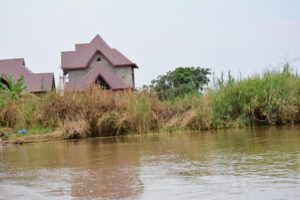
The construction of buildings such as this violates article 5 of the Water Code in Burundi that forbids building up to 150 metres from the Tanganyika shoreline.
The water of Lake Tanganyika is becoming increasingly polluted partly due to the classic cause: human activity.
Authorities in the Ministry in charge of environment say building in protected areas, especially on the lakeside of Bujumbura city, and raw sewage dumped at the lake have polluted its water.
Fish have declined and the water has become too dirty that the Water and Electricity Authority (REGIDESO) collects water it caters for Bujumbura residents from 3.5 km offshore while it used to collect it from 1.8 km.
Lake Tanganyika is the second deepest and the longest freshwater lake on the planet. It has at least 2,000 species of fish. The majority of the species are unique to Tanganyika. The Lake is the main source of water for inhabitants of Bujumbura. Fishing in its waters provides a living for about 100, 000 people and is the source of a third of animal proteins in Burundi.
In addition to pollution, climate change and over-fishing are considered major contributors to loss of biodiversity in the Lake. A recent study by Andrew S. Cohen and team has concluded that global warming was responsible for the reduction of fish production and benthic habitat.
Excess loads of sediment and nutrients caused by erosion in the watershed also constitute one of the main threats to biodiversity in the Lake according to UNDP and the Ministry of Environment.
As for pollution on the lakeside of Bujumbura, the root cause is the failure of law enforcement. Officials from the Ministry of Environment say the law is clear that, for example it is forbidden to build up to 150 metres from the shoreline. But people do not respect that. “Even the signposts have been removed”, says Emmanuel Ndorimana, the Director General of Water and Sanitation within the Ministry of Environment.
The question that arises is whether those who break the law are stronger than the government. Officials say they are not, but accuse those charged with enacting the law of being corrupt.
“There are bad apples among those the government sends to enforce the law”, says Amissi Ntemako the Director General of Urbanism and Settlement in the Ministry of Environment.
Ndorimana says that the local administration can be complicit in violating the law, or can fail to take appropriate action to enforce it. “The Ministry does not have enough personnel to watch day and night protected areas”, he says. “Local authorities should be the eye of the government”.
The problem is further complicated by fake title deeds that some people possess. Others have occupied the sites before the law protecting the areas was passed. Ndorimana says the latter have a right to compensation.



















 IWACU Open Data
IWACU Open Data

